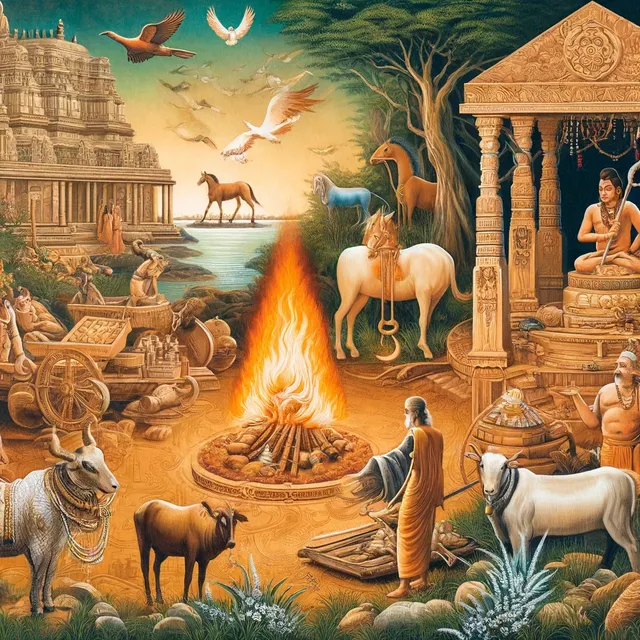The Culture of Animal Sacrifice in Sanatan Dharma
Introduction
Sanatan Dharma, also known as Hinduism, is one of the world's oldest religious traditions. It encompasses a wide range of beliefs, practices, and rituals. One of the more controversial practices within certain sects and regions is the tradition of animal sacrifice, known as "Bali." This article explores the historical and cultural significance of animal sacrifice in Sanatan Dharma, its current practice, and the ongoing debates surrounding it.
Historical Context
Animal sacrifice has ancient roots in Hindu rituals, tracing back to the Vedic period. The Vedas, which are among the oldest sacred texts of Hinduism, mention various forms of sacrifices, including animal sacrifices, as offerings to deities. These rituals were believed to appease the gods, ensure prosperity, and maintain cosmic order.
Types of Animal Sacrifices
- Ashvamedha (Horse Sacrifice): An ancient royal ritual performed by kings to assert their dominance and seek divine blessings for their reign.
- Gomedha and Ajammedha (Cow and Goat Sacrifices): These were conducted to invoke specific deities and seek their favor.
- Yajna (Fire Sacrifice): Animals were often sacrificed during grand fire rituals to please the gods and ensure societal welfare.
Cultural Significance
Animal sacrifice in Hinduism was deeply intertwined with the social and religious fabric of ancient Indian society. It was believed that the sacrifice of an animal, symbolizing the relinquishment of one's own ego and material attachments, would lead to spiritual merit and divine favor.
Rituals and Festivals
- Durga Puja and Kali Puja: In some regions, especially in West Bengal, Assam, and Odisha, animal sacrifices are performed during these festivals to honor the goddesses Durga and Kali.
- Chhinnamasta Temple in Rajrappa: This temple in Jharkhand is known for its ritual of offering animal sacrifices to the goddess Chhinnamasta.
Modern Practices and Controversies
While animal sacrifice remains a ritualistic practice in some Hindu communities, it has also become a subject of significant debate and controversy.
Arguments in Favor
- Tradition and Faith: Proponents argue that animal sacrifice is an integral part of their religious tradition and a sincere act of devotion.
- Cultural Identity: For many, these rituals are a way to preserve and express their cultural heritage and religious identity.
Arguments Against
- Ethical Concerns: Opponents highlight the cruelty and inhumanity involved in animal sacrifices, advocating for more compassionate forms of worship.
- Legal and Social Issues: In many places, animal sacrifices are regulated or banned due to animal rights laws and changing social attitudes towards animal welfare.
Alternatives and Reform Movements
In response to growing ethical concerns and legal restrictions, many Hindu communities and reform movements have sought alternative ways to honor their deities. These include:
- Symbolic Offerings: Substituting live animals with symbolic offerings like coconuts, pumpkins, or effigies.
- Vegetarianism and Ahimsa: Emphasizing the principles of non-violence (Ahimsa) and promoting vegetarianism as a more compassionate way of life.
- Spiritual Reform Movements: Various reform movements within Hinduism, such as the Arya Samaj and Brahmo Samaj, advocate for the abolition of animal sacrifices and the adoption of more humane practices.
Conclusion
The practice of animal sacrifice in Sanatan Dharma is a complex and multifaceted issue, deeply rooted in ancient traditions but increasingly challenged by modern ethical standards and legal frameworks. As Hinduism continues to evolve, so too does the conversation around the place of animal sacrifice within its diverse and dynamic tapestry. The ongoing dialogue between tradition and modernity will shape the future of this practice in Hindu society.
References
- "The Vedas and Animal Sacrifice" - An exploration of sacrificial rites in Vedic texts.
- "Durga Puja: Tradition and Transformation" - A study on the evolution of rituals in Durga worship.
- "Animal Rights and Hinduism" - A discussion on contemporary ethical debates within Hindu communities.

Congratulations, your post has been upvoted by @upex with a 58.35% upvote. We invite you to continue producing quality content and join our Discord community here. Keep up the good work! #upex